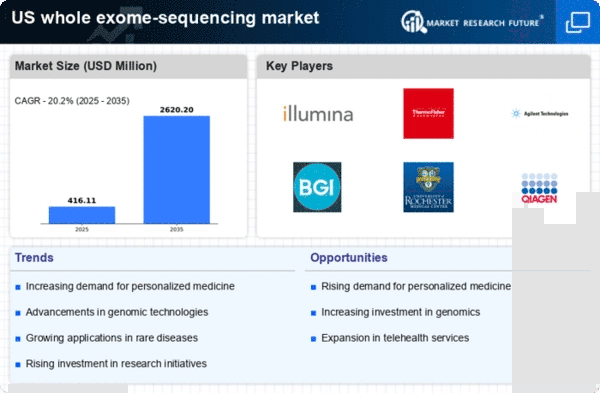0
{"key"=>"0", "value"=>"
{\"key\"=>\"Increased Focus on Rare Diseases\", \"value\"=>\"
The rising focus on rare diseases is influencing the whole exome-sequencing market. With approximately 7,000 known rare diseases affecting millions in the US, there is a growing need for effective diagnostic tools. Whole exome sequencing offers a comprehensive approach to identifying genetic mutations responsible for these conditions. In 2025, it is estimated that around 80% of rare diseases have a genetic component, highlighting the relevance of this technology. As healthcare systems prioritize the diagnosis and treatment of rare diseases, the whole exome-sequencing market is likely to see substantial growth, driven by both patient demand and clinical necessity.
\"}
"}
1
{"key"=>"1", "value"=>"
{\"key\"=>\"Rising Demand for Genetic Testing\", \"value\"=>\"
The increasing awareness of genetic disorders and the importance of early diagnosis is driving the whole exome-sequencing market. Patients and healthcare providers are recognizing the value of genetic testing in personalized medicine. According to recent data, the market for genetic testing in the US is projected to reach approximately $10 billion by 2026, with whole exome sequencing playing a pivotal role. This demand is fueled by the need for tailored treatment plans and the ability to identify hereditary conditions. As more individuals seek genetic insights, the whole exome-sequencing market is likely to expand, providing healthcare professionals with essential tools for effective patient management.
\"}
"}
2
{"key"=>"2", "value"=>"
{\"key\"=>\"Advancements in Bioinformatics Solutions\", \"value\"=>\"
Advancements in bioinformatics solutions are playing a crucial role in the whole exome-sequencing market. The ability to analyze and interpret vast amounts of genomic data is essential for the effective application of whole exome sequencing. In 2025, the bioinformatics market is projected to reach $5 billion, with a significant portion dedicated to genomic data analysis. Enhanced software tools and algorithms are enabling researchers and clinicians to derive meaningful insights from sequencing data, thereby improving diagnostic accuracy. As bioinformatics continues to evolve, it is expected to bolster the whole exome-sequencing market by facilitating more efficient data processing and interpretation.
\"}
"}
3
{"key"=>"3", "value"=>"
{\"key\"=>\"Growing Investment in Genomic Technologies\", \"value\"=>\"
Investment in genomic technologies is a key driver of the whole exome-sequencing market. Venture capital funding for biotech companies specializing in genomic sequencing has surged, with estimates suggesting an increase of over 30% in 2025 compared to previous years. This influx of capital is enabling companies to innovate and enhance their sequencing platforms, making them more accessible and cost-effective. As the technology becomes more affordable, healthcare providers are likely to adopt whole exome sequencing more widely, further propelling market growth. The trend indicates a robust future for the whole exome-sequencing market as it aligns with the broader shift towards precision medicine.
\"}
"}
4
{"key"=>"4", "value"=>"
{\"key\"=>\"Integration of Exome Sequencing in Research\", \"value\"=>\"
The integration of whole exome sequencing into research initiatives is significantly impacting the whole exome-sequencing market. Academic institutions and research organizations are increasingly utilizing this technology to explore genetic variations associated with diseases. This trend is supported by funding from government agencies, which has seen a rise in grants for genomic research. In 2025, the National Institutes of Health (NIH) allocated over $3 billion for genomic research, indicating a strong commitment to advancing this field. As research continues to uncover the genetic basis of diseases, the whole exome-sequencing market is expected to benefit from increased collaboration between academia and industry.
\"}
"}
















